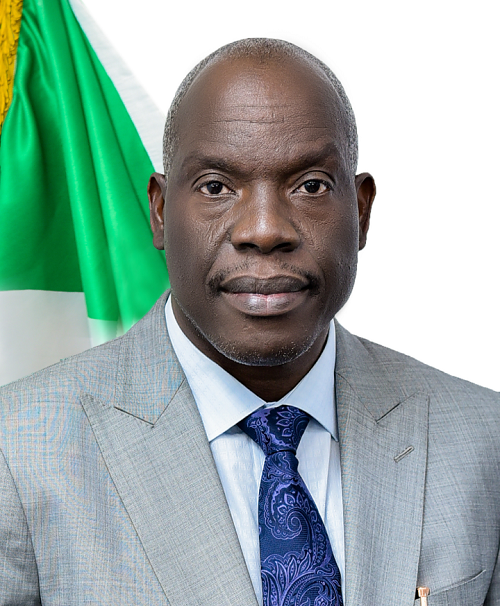Engr. Gbenga Komolafe, CCE, NUPRC
…Oil and gas will continue to play a critical role in meeting global energy demand.
…Rebound outcome of deliberate regulatory design, anchored on transparency, efficiency and inclusiveness.
-Felix Douglas
Commission Chief Executive (CCE), Nigerian Upstream Petroleum Regulatory Commission (NUPRC), Engr. Gbenga Komolafe, spoke during the Nigeria Association of Energy Correspondents (NAEC) annual conference that over the years, NAEC has remained a credible partner in shaping narratives around Nigeria’s energy sector, offering clarity, context and balance to public discourse. The Commission deeply values this relationship, as accurate and verified reporting plays a critical role in sustaining investor confidence and public trust in upstream operations.
The CCE acknowledged that when NUPRC was inaugurated four years ago, it inherited a complex landscape defined by declining investments, waning exploration activity and operational uncertainties. However, with the passage of the Petroleum Industry Act (PIA) 2021, Nigeria entered a new era of regulatory clarity, transparency and predictability. The Act provided the solid foundation upon which the Commission has built the framework for the industry’s recovery and growth.
Presently, the pillars for an upstream rebound have been firmly laid and measurable progress is being recorded.
Engr. Komolafe added that at the global level, the energy terrain is evolving faster than ever before. Traditional hydrocarbon investments now compete with clean and renewable energy sources, as nations seek to balance growth with decarbonization.
According to the CCE, the International Energy Agency (IEA) has affirmed that oil and gas will continue to play a critical role in meeting global energy demand for decades to come, particularly in developing economies. The challenge and opportunity lies in producing these resources responsibly, efficiently and sustainably.
However, in recognition of this global reality, NUPRC has implemented a series of transformative regulatory interventions designed to reposition Nigeria’s upstream sector for competitiveness, resilience and sustainable growth. Through these efforts, the Commission is not only driving the rebound of the oil and gas industry, but also shaping Nigeria’s long-term energy future.
The first major step of the Commission was to enhance data transparency and accessibility. Investment decisions in oil and gas are inherently data-driven and without reliable geological information, even the most promising basins remain unattractive. The Commission embarked on an ambitious campaign to acquire, reprocess and digitize seismic data across frontier and producing basins. Over 17,000 line-kilometres of 2D and 28,000 square kilometres of 3D seismic data have been reprocessed to global standards, significantly reducing exploration risks and unlocking new investment frontiers.
In addition, the Commission introduced a fully digitalized and transparent licensing process. During the 2024 mini-bid round, human interface was minimized and transparency maximized.
Engr. Komolafe revealed that signature bonuses were reviewed downward from about $100 million to $10 million, allowing investors to commit more resources to field development. This single decision has strengthened investor confidence, encouraged early production and reinforced Nigeria’s reputation as an open and competitive upstream jurisdiction.
The Commission also prioritized production optimization and recovery enhancement. By reviewing field development plans, supporting brownfield optimization and enabling the re-entry of shut-in wells, NUPRC has facilitated renewed activity across mature assets.
These interventions are projected to deliver incremental volumes exceeding one million barrels of oil per day, a key milestone toward achieving the national production target of 2.5 million BOPD by 2027.
A sustainable rebound also demands secure infrastructure and credible measurement systems. The Commission has collaborated with security agencies, private contractors and community stakeholders in implementing the Upstream Measurement Regulation and Advance Cargo Declaration Regulation. The result is a remarkable 90 percent reduction in crude oil theft from over 102,000 barrels per day in 2021 to 9,600 barrels per day as of September 2025.
Equally transformative is NUPRC work in host community development. By implementing the PIA’s Host Communities Development Trust (HCDT) provisions, the Commission has successfully inaugurated over 90 Trusts across the Niger Delta, ensuring that development funds flow directly to communities. This model not only secures local ownership, but also guarantees peace, stability and continuity in production, key pillars for sustained energy security.
Engr. Komolafe pointed further that the rebound the country is witnessing in upstream sector is not by chance; it is the outcome of deliberate regulatory design, anchored on transparency, efficiency and inclusiveness. The Commission’s strategic vision aligns with Nigeria’s broader economic goals and global sustainability commitments.
Gas Development
NUPRC is advancing Nigeria’s gas agenda as part of the “Decade of Gas” and the nation’s energy transition pathway. Natural gas remains the country’s most reliable transition fuel, a catalyst for industrialization, power generation and clean energy substitution.
By promoting gas monetization, flare elimination and gas-based investments, the Commission is reinforcing Nigeria’s commitment to a just and balanced energy transition. Globally, the context reinforces this direction.
While renewable will continue to grow, hydrocarbons will remain central to industrialization, particularly in emerging economies like Nigeria.
NUPRC task therefore, is to ensure that this production is done efficiently, transparently and sustainably, consistent with international best practice.
The NUPRC boss made it known that in the evolving energy landscape; the media remain a vital stakeholder.
Therefore, information is power and in the energy sector, accurate reporting shapes perceptions, influences investments and builds credibility. I urge NAEC members and the wider press community, to continue ensuring that their reports are factual, verified and development-oriented. Responsible reporting strengthens investor confidence and preserves national reputation; misinformation on the other hand, can distort progress and discourage the very investments our nation seeks to attract.
Engr. Komolafe said NUPRC recognizes NAEC as a strategic partner in the mission to deepen transparency and public awareness. The Commission will continue to collaborate with the association through data access, training, and technical briefings, ensuring that Nigerian public receives balanced, accurate and timely information about the upstream industry.
In the near future, the priorities of NUPRC is clear which is to sustain Nigeria’s upstream rebound, achieve 2.5 million BOPD by 2027, strengthen gas monetization, protect energy infrastructure and uphold the principles of transparency, accountability and efficiency that define regulatory mandate.


Comment here